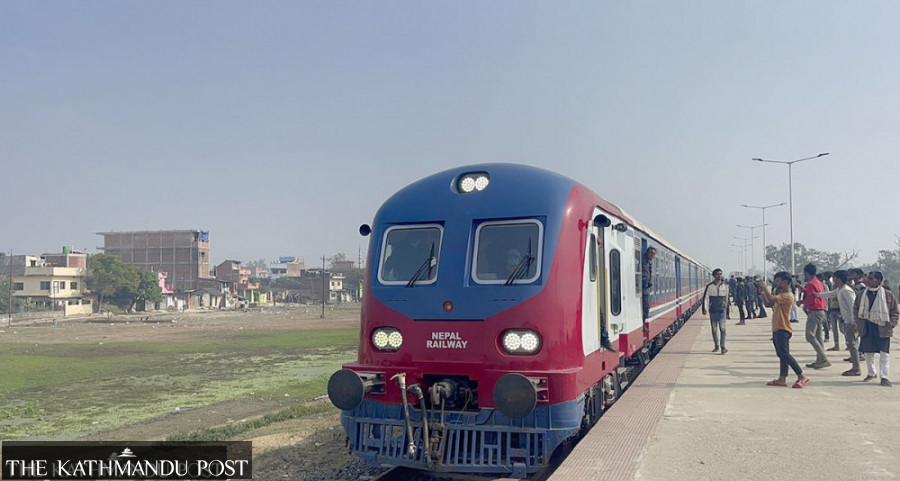
These days, the Kurtha-Jayanagar cross-border railway track between Nepal and India offers an interesting sight. Locals see two trains chugging along the tracks once every day, between 11am and 1pm. But neither carries passengers.
The two trains have been doing dry runs since February 13, about a year and a half after they arrived in Nepal from India in September 2020.
Even the Nepal Railway Company does not know when it will be able to start passenger train service.
The 35-kilometre Kurtha-Jayanagar cross-border railway is yet another example of how politics usually stalls every other project in Nepal.
Niranjan Jha, general manager of the Nepal Railway Company, says the trains cannot start passenger service unless there is a dedicated law on railway operation covering issues including the roles and responsibilities of the authorities and passengers, and penalty for breach of rules, among other things.
An ordinance introduced on December 1 expired on February 14, a day after the railway company started its dry runs of the trains.
Since May 5 last year, the government has introduced the ordinance twice in order to operate the trains. Both times they failed to get through the Parliament.
An ordinance needs to be passed by Parliament within 60 days from the date of its registration. Since the main opposition CPN-UML has continuously obstructed the House proceedings, the ordinance issued for the second time also has become void.
“We are waiting for the government to issue yet another ordinance after the current session of the Parliament ends,” said Jha.
The second ordinance governing the railway operation was an important step towards the resumption of railway service after Nepal and India signed a standard operating procedure for the railway service in early October. The Indian contractor, IRCON International Ltd, officially handed over the Kurtha-Jayanagar section of the railway infrastructure to Nepal in late October.
First built as a cargo line to carry timber from Nepal to India in 1937, the 35-km railway from Janakpur in Nepal to Jaynagar in Bihar of India was a lifeline for the people in Janakpur. But the train was later consigned to oblivion with the government paying no attention to its operation.
Operation of the two trains will provide a faster mode of transport for the people and is expected to boost local trade and businesses.
In early January, the Nepal Railway Company hired 58 employees that included staffers to check the railway track and signal masters–key components of any railway service. The company also invited the railway staff from Konkan Railway Corporation Ltd to assist in the operation as per an agreement signed between two companies.
As per the agreement signed between the two companies, Konkan Railway Corporation Ltd, which had supplied the two train sets to Nepal, is to assign 26 staff, including crew members, to operate the rail service for a year.
The two sides had signed an INR 220 million (Rs350 million) agreement for the procurement of the locomotives, human resources supply, rail and track maintenance and other operating systems. Nine railway staff from the Konkan Railway are currently carrying out the dry runs, according to Jha.
The company has also fixed passenger fares. A general coach ticket will cost Rs70. According to officials, a ticket in an air-conditioned coach will cost Rs300. The travel time from Kurtha to Jayanagar will be about an hour and a half.
“We were just waiting for the date of inauguration in late February or early March. Prime ministers of Nepal and India were supposed to formally inaugurate the train service, but this could not happen because of other priorities of the Nepal government,” said Jha. “Now, with no law in place, we don’t know when will we be able to start passenger services.”
Now the train is running, once a day, without generating any income.
“It takes 70 litres of diesel for once a day operation,” said Jha. “We have to pay the staff salaries and there are other administrative expenses.”
Since the dry runs have been continuing since February 13, so far, on an average, over Rs200,000 has been spent on diesel alone.
Two sets of trains were handed over to Nepal in September 2020. But they remain unused for nearly a year and a half, exposing Nepal’s lack of planning and execution.
Jha said at least the railway company has started the dry runs and this means passenger services can start as soon as a law is introduced.
“We will continue operating them without passengers until the railway service is formally inaugurated,” said Jha. “It will help us learn ways to resolve potential problems or obstructions while operating the passenger service.”











